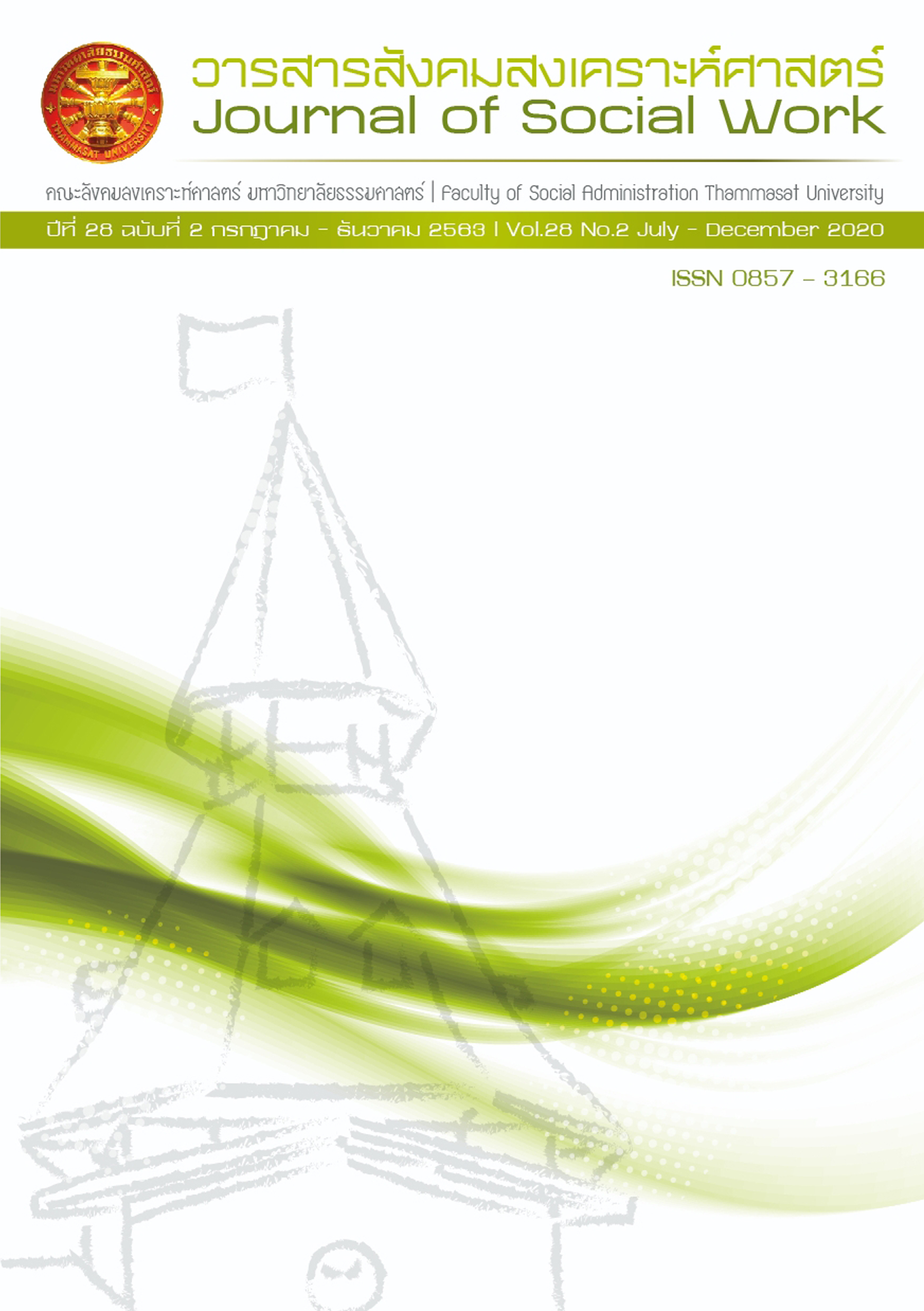Social Welfare Management in Zakat Fund Organizations in Malaysia
Keywords:
Zakat Fund, Zakat distribution and collection system, social welfare servicesAbstract
The Zakat fund in Malaysia is collected from a religious obligation of alms-giving treated in Islam. This research aims to: (1) study the system of collecting and distributing zakat in Malaysia; (2) study the roles and plans of the zakat fund management organizations in Malaysia; and (3) to synthesize and propose a recommendation to develop a zakat fund management in Thailand. The researchers employed the mixed methods approaches. For qualitative approaches, studying from relevant documents, interviewing with zakat organization administrators in three states form Kuala Lumpur, Melaka and Kelantan. Organizing group discussion with those 30 zakat stakeholders were used as research methods. For quantitative approach, 300 research questionnaires were collected from zakat payers, zakat recipients and non-Muslims form three states and using descriptive and inferential statistics to analyze. The results showed that:
(1) Zakat fund management in Malaysia is conducted by the Islamic religious councils in each state. Companies are established in some states to operate in zakat management under the supervision of the Islamic religious council. (2) The zakat fund management organizations in each state are responsible for establishing management policies, operations, and preparing performance reports. Social welfare provided from the zakat fund is a protective welfare with aims of achieving sustainable development among zakat recipients (Productive welfare) and reducing social inequality. The Zakat Fund in Malaysia is therefore an important tool in tackling social problems and reducing the burden of government agencies in taking care of the welfare of the people.
(3) In order to optimize the management of Zakat Funds in Thailand for maximum efficiency, there is a need for legislation to certify the status and operation of Zakat Funds and national Zakat Fund Organization should be established under the supervision of the government to support and regulate local zakat fund organization.
References
ทัศนีย์ ลักขณาภิชนชัช. (2545). การใช้ทรัพยากรในงานสวัสดิการสังคม. พิมพ์ครั้งที่ 1. กรุงเทพฯ: สมชายการพิมพ์.
บรรจง บินกาซัน. (2523). เศรษฐศาสตร์อิสลาม. กรุงเทพฯ: อิสลามิคอะเคเดมี
อิสรา ศาสนติศาสน์. (2562). ทำไมจึงต้องส่งเสริมการจัดตั้งกองทุนซะกาต. ใน ซะกาตกับการสร้างความยุติธรรมทางสังคม. ที่ระลึกงานซะกาตสัมพันธ์ ครั้งที่ 2 กองทุนซะกาต
(บัยตุ้ลมาล) จังหวัดเชียงใหม่ 27 เมษายน พ.ศ. 2562
อิสรา ศานติศาสน์ และศรัณย์ ศานติศาสน์. (2562). เศรษฐศาสตร์ว่าด้วยเรื่องของซะกาตและความยากจนของมุสลิมไทย. บทความนำเสนอในที่ประชุมวิชาการประจำปี สถาบัน
พัฒนบริหารศาสตร์.
อิสเรศ มะหะหมัด. (2551). ความสำคัญของซะกาตในอิสลาม. สืบค้นเมื่อ 7 พฤศจิกายน 2561, จาก https://islamicfinancethai.com/ซะกาต-zakat/ความสำคัญของซะกาต/
อิสเรศ มะหะหมัด. (2561). ซะกาตทรัพย์สิน(มาล). สืบค้นเมื่อ 7 พฤศจิกายน 2561, จาก https://islamicfinancethai.com/ซะกาต-zakat/ซะกาตมาล/
อรุณ บุญชม. (2559). ซะกาตตามหลักการศาสนาอิสลาม. สำนักงานคณะกรรมการอิสลามประจำกรุงเทพมหานคร. สืบค้นเมื่อ 7 พฤศจิกายน 2562, จาก
https://www.islamicbangkok.or.th/2016/03/26/ซะกาตตามหลักการศาสนาอิสลาม.html
Ab Rahman, Azman., Alias, Mohammad Haji., and Omar, Syed Mohd Najib Syed. (2012). Zakat Institution in Malaysia: Problems and Issues. GJAT 2(1)
(pp. 35-41). Retrieved from GJAT: http://www.gjat.my/gjat062012/gjat1220120201.pdf.
Jafree, M. K. and M.R.Amin (2003). ‘Administering Zakah: State of the Art and Looking Beyond’ in S.A. Hannan et al. eds. Zakat and Poverty Alleviation
(Compilation of the articles presented in the International Seminar on Zakat and Poverty Alleviation in Bangladesh, held during December 14-15,
(Dhaka: Islamic Economics Research Bureau), pp 80-92.
Mohd Ridhwan Ab. Aziz. (2013). Introduction to Islamic Institutions in Economic and Finance. Negeri Sembilan: USIM Publ.
Muhsin Nor Paizin. (2017, February). Usage of Islamic Alms’s Online Portal: Case Study on Pusat Pungutan Zakat (PPZ), Federal Territories of
Malaysia. Intellectual Property Rights. 5(1): 1. Retrieved Dec 15, 2018, from https://www.omicsonline.org/open- access/usage-of-islamic-almss-online-portal-case-study-on-pusat-pungutanzakat-ppz- federal-territories-of- malaysia-2375-4516-100075.php?aid=87487
PPZ-MAIWP. (2017). Laporan Zakat 2017: Satu Sumber Maklumat Makat di Malaysia. Kuala Lumpur
PPZ-MAIWP. (2018). Sejarah. Retrieved December 16, 2018 from http://www.zakat.com.my/info-ppz/sejarah/
PZM. (2018, November). เอกสารประกอบคำบรรยายเรื่องการจัดการซะกาตของศูนย์จัดเก็บซะกาตรัฐ มะละกา PZM. (เอกสารอิเล็กทรอนิกส์)
Razimi, Mohd Shahril., Romle, Abd Rahim., and Erdris, Muhammad Farid. (2016). Zakat Management in Malaysia: A Review. American-Eurasian Journal
of Scientific Research 11(6) (pp. 453-457).
Rahman, Azman A.; Alias, Mohd. Haji., & Omar, Syed Mohd. Najib Syed. (2012, June). Zakat Institution in Malaysia: Problems and Issues. Global
Journal Al-Thaqafah (GJAT). 2(1). Retrieved Dec 15, 2018, from http://www.gjat.my/gjat062012/gjat1220120201.pdf
Zakaria, Maheran. (2018). Role of Zakah Institution in Governing and Transforming Beneficiary’s Living Standard from the Level of Daruriyyat (Dire
Necessities) to Hajiyyat (Comfort Living) in Relation to Maqasid al Syariah. Pertanika Journal of Scholarly Research Reviews, 4(2): 43-48
Published
How to Cite
Issue
Section
License
The manuscripts published in the Social Work Journal is the copyright of the Social Work Journal, Thammasat University
Any article or opinion appeared in the Social Work Journal will solely be under the responsibility of the author The Faculty of Social Administration, Thammasat University and the editors do not need to reach in agreement or hold any responsibility.



